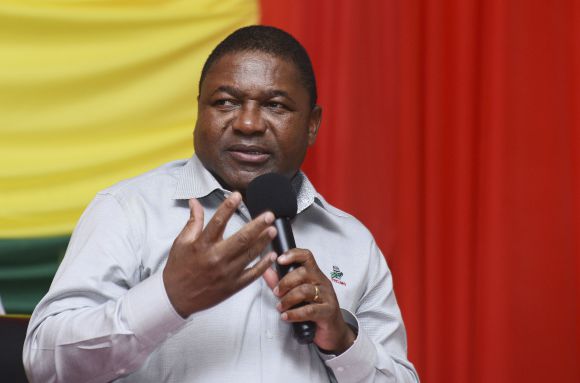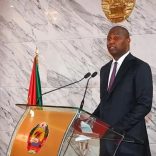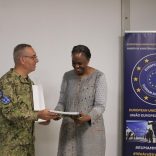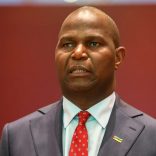Mozambique: Mondlane reaches agreement with Portuguese right-wing party - AIM report
President Nyusi to discuss crisis in Mozambique with European institutions

Angop (File photo) / President of Mozambique Filipe Jacinto Nyusi
Mozambican President Filipe Nyusi is making a two-day visit to Brussels starting Thursday and plans to discuss the ongoing political and economic crisis in Mozambique with the heads of major European institutions.
“It is an opportunity to find space at the highest level for dialogue with the European Union, focusing on the economic crisis and parallel political crisis,” EU representative in Maputo Sven von Burgsdorff told Lusa.
Nyusi’s visit, his first to Brussels, follows visits to Mozambique’s other major European partners, Portugal and France, in July last year.
The visit was confirmed in February during the visit of the High Representative of the EU for Foreign Affairs and Security, Federica Mogherini, to Maputo, when she warned that political instability in Mozambique was threatening the country’s decades of achievement.
Renewed political and military tension in Mozambique, combined with economic difficulties, poses “a major challenge for Mozambican authorities and people,” von Burgsdorff noted, and Nyusi’s visit to Brussels constitutes “an opportunity to speak frankly about these challenges and look for the best way to solve them”.
President Nyusi will meet the president of the European Commission, Jean-Claude Juncker, Federica Mogherini, Martin Schulz, president of the European Parliament, and European Council president, Donald Tusk.
Mozambique is experiencing a political and military crisis characterized by clashes between the defence and security forces and the armed wing of the Mozambican National Resistance (Renamo) in the centre of the country, and attacks on military and civilian vehicles on main roads in the area, attributed to the main opposition party.
At the heart of the crisis is the refusal of Renamo to recognize the results of the general elections of 2014 and its demand to rule in the six provinces where it claims victory at the polls, with the resumption of negotiations now dependent on mediation by South Africa, the European Union and Catholic intermediaries.
Stressing that the EU has not received any formal request for mediation from the government or Renamo, von Burgsdorff commented that the European bloc “is 100 percent available to support the country” in the peace process.
“If the parties involved insist in our presence, we will not object,” he said, noting that the EU has a 32-year relationship with Mozambique.
The Mozambican economy has been hit by a sharp drop in the metical against the dollar, with exports declining and inflation rising as a result of both external causes such as the low world price of raw materials and persistent drought affecting hundreds of thousands of people.
Worsening public debt poses another threat at a time when Mozambique had succeeded in restructuring US$850 million of debt contracted by the state tuna-fishing company Ematum, but finds itself again shaken by reports in the press about a second undisclosed loan to the same entity.
On this second loan, the EU representative said that he did not yet have “any official information from the government or the [International Monetary Fund and World Bank] institutions,” and was awaiting further information.
Revelations of the second undisclosed loan led to the cancellation on Frida












Leave a Reply
Be the First to Comment!
You must be logged in to post a comment.
You must be logged in to post a comment.